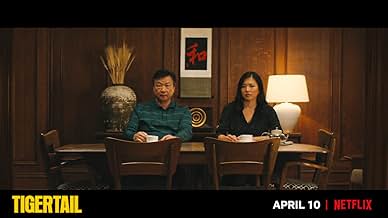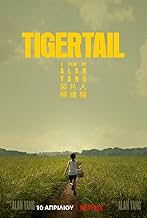IMDb-BEWERTUNG
6,6/10
3961
IHRE BEWERTUNG
Über den Verlauf von mehreren Generationen erzählte Geschichte einer taiwanesischen Familie, beginnend im Taiwan der 1950er-Jahre, endend im heutigen New York City.Über den Verlauf von mehreren Generationen erzählte Geschichte einer taiwanesischen Familie, beginnend im Taiwan der 1950er-Jahre, endend im heutigen New York City.Über den Verlauf von mehreren Generationen erzählte Geschichte einer taiwanesischen Familie, beginnend im Taiwan der 1950er-Jahre, endend im heutigen New York City.
- Auszeichnungen
- 2 Gewinne & 1 Nominierung insgesamt
Queenie Yu-Hsin Fang
- Young Yuan
- (as Yo-Hsing Fang)
Kuei-Mei Yang
- Minghua
- (as Yang Kuei-Mei)
Lynn Masako Cheng
- Child Angela
- (as Lynn Cheng)
Che-Hao Chang
- Kuomintang Soldier #1
- (as Che Hao Chang)
Empfohlene Bewertungen
Now available on Netflix, this multi-generational drama follows a Taiwanese factory worker who leaves his homeland to seek opportunity in the US, where he struggles to find connection while balancing family and newfound responsibilities.
The two aspects I loved the most about Tigertail were the score (which sounded amazing and perfectly fit the tone) and the non-linear storytelling that kept the story interesting to follow. I, also, liked how they shot part of the movie on film - when the lead character was young - as it gave it more personality. Other than that, I found Tigertail to be a rather by-the-books drama with interesting but, perhaps, underdeveloped commentary on immigration. The movie is quite short and never feels dull or boring, though, so I would recommend it to fans of this kind of dramas.
6/10 or 7/10 (can't decide)
The two aspects I loved the most about Tigertail were the score (which sounded amazing and perfectly fit the tone) and the non-linear storytelling that kept the story interesting to follow. I, also, liked how they shot part of the movie on film - when the lead character was young - as it gave it more personality. Other than that, I found Tigertail to be a rather by-the-books drama with interesting but, perhaps, underdeveloped commentary on immigration. The movie is quite short and never feels dull or boring, though, so I would recommend it to fans of this kind of dramas.
6/10 or 7/10 (can't decide)
I have beared witness to my Taiwanese family and friends who also left Taiwan in the late 60's and early 70's. The emotional and financial sacrifice to forge a possibly(but not guaranteed) better future for your family in a land of a different tongue and color is tremendous. It takes a special breed of person to take upon this burden. Certainly not the type of entitled brats who so easily criticize the accents of the actors. To me, the spoken Taiwanese, the rice fields, the Taiwanese house courtyards, the nightmarkets, the obligatory piano playing are all a jumbulaya of nostalgia for me. This story rings true to me. Sorry for the rant. I'm hungry now, Wa be ki ja bung.
A movie about people from Taiwan who came to US after they are in their twenties, however, the cast was picked of actors mostly from mainland China and USA.
Watching them speaking mandarin as Taiwanese with strong mainland accent; or speaking perfect native English as an aged Taiwanese is just unreal.
The director should simply hire Taiwanese cast to shoot the film.
Writer-director Alan Yang has absorbed the full measure of auteur Wong Kar Wai, whose lovingly intimate In the Mood for Love is my litmus test for modern Asian cinema at its best. Although Netflix's Tigertail may be more realistic than Mood, it captures a middle-aged Ping Jui (Tzi Ma) romanticizing his past as he struggles to connect with his estranged daughter, Angela (Christine Ko) in the present.
Do not look to this drama for an eye-popping American love story, for it is Asian in its restraint and its lyrical understatement. After facing deep disappointment as an immigrant to America with his arranged wife, handsome Ping adjusts to the realities of life and the boredom of his marriage.
Salving his despair are the images of his former love, Yuan (Joan Chen), whom he left to go to America on his factory boss's dime and with the boss's daughter as bride. Although American romances often end with a pleasant alignment, Yang does not indulge us on such fantasies.
Tigertail smacks us with the vagaries of immigration, not the thorny process the news underlines today but rather the disappointment an immigrant might experience as he watches his American dream collapse under the weight of a reality check that includes substandard housing and menial jobs.
The latter part of Tigertail is about the glacial change that comes to Ping after his mom dies, his wife leaves him, and he must try to connect with Angela, unaccustomed as he is to saying anything much of anything to her. His Asian paternalism and cold restraint make communication challenging.
The painful reunion is the strength of the film: Most of us have at least one family member we should reach out to, but we may lack the willingness or interpersonal skills. Yet, those skills can come slowly but surely as we face them to overcome them.
Tigertail is a small drama filled with humanity, superior acting, and enviable cinematography. John Ford would be happy to see how Yang honors him with a final shot that recalls the famous frame shot in The Searchers. Tzi is no John Wayne, but they share characters with a remoteness that plagues cultures and families for all times.
As we struggle with the pandemic's demand for social distancing, Tigertail shows the effects of it in everyday real life.
Do not look to this drama for an eye-popping American love story, for it is Asian in its restraint and its lyrical understatement. After facing deep disappointment as an immigrant to America with his arranged wife, handsome Ping adjusts to the realities of life and the boredom of his marriage.
Salving his despair are the images of his former love, Yuan (Joan Chen), whom he left to go to America on his factory boss's dime and with the boss's daughter as bride. Although American romances often end with a pleasant alignment, Yang does not indulge us on such fantasies.
Tigertail smacks us with the vagaries of immigration, not the thorny process the news underlines today but rather the disappointment an immigrant might experience as he watches his American dream collapse under the weight of a reality check that includes substandard housing and menial jobs.
The latter part of Tigertail is about the glacial change that comes to Ping after his mom dies, his wife leaves him, and he must try to connect with Angela, unaccustomed as he is to saying anything much of anything to her. His Asian paternalism and cold restraint make communication challenging.
The painful reunion is the strength of the film: Most of us have at least one family member we should reach out to, but we may lack the willingness or interpersonal skills. Yet, those skills can come slowly but surely as we face them to overcome them.
Tigertail is a small drama filled with humanity, superior acting, and enviable cinematography. John Ford would be happy to see how Yang honors him with a final shot that recalls the famous frame shot in The Searchers. Tzi is no John Wayne, but they share characters with a remoteness that plagues cultures and families for all times.
As we struggle with the pandemic's demand for social distancing, Tigertail shows the effects of it in everyday real life.
A touching father daughter relationship at the core of it. A bit of a downer but it redeemed itself with a heartfelt ending
The 'Tigertail' Cast Name Their Asian Cinema Picks
The 'Tigertail' Cast Name Their Asian Cinema Picks
Tigertail writer/director Alan Yang is joined by stars Tzi Ma and Christine Ko to name some of their favorite films for you to check out in Asian Cinema.
Wusstest du schon
- WissenswertesAll of the flashback scenes were shot on 16mm film while all the present day scenes were shot on digital.
Top-Auswahl
Melde dich zum Bewerten an und greife auf die Watchlist für personalisierte Empfehlungen zu.
- How long is Tigertail?Powered by Alexa
Details
- Laufzeit1 Stunde 31 Minuten
- Farbe
- Seitenverhältnis
- 2.39 : 1
Zu dieser Seite beitragen
Bearbeitung vorschlagen oder fehlenden Inhalt hinzufügen







































